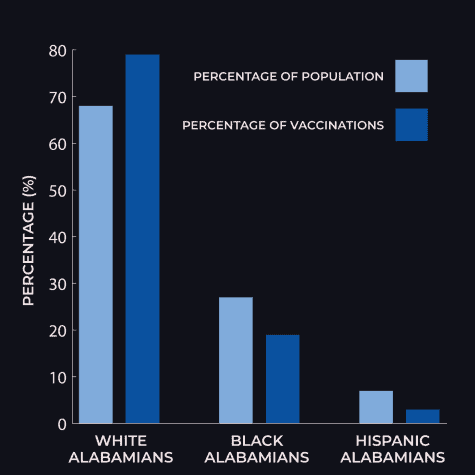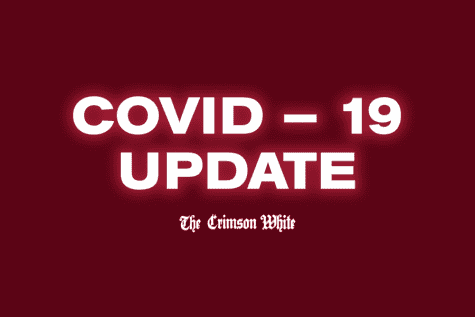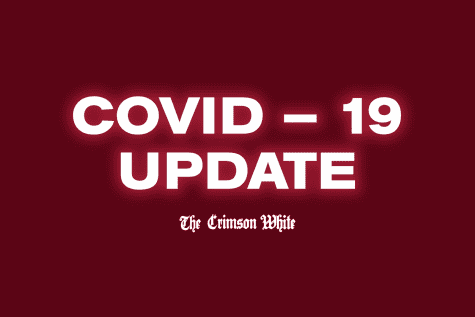These local groups are joining a monthlong effort to vaccinate underserved communities
Black and Hispanic Alabamians are at greater risk for COVID-19. Here’s why one West End church is joining a local effort to bridge those disparities.
A health care worker at University Medical Center prepares to vaccinate medical professionals in UA’s first rollout of the Moderna vaccine.
March 11, 2021
The Tuscaloosa County Emergency Management Agency (EMA) is offering COVID-19 vaccination registration pop-up sites through the month of March to help eligible, hard-to-reach Tuscaloosa County residents sign up for COVID-19 vaccinations.
The first pop-up registration site was held at the McDonald Hughes Community Center on March 3, where the EMA registered over 200 Tuscaloosa County residents to receive a COVID-19 vaccination at DCH Regional Medical Center.
In late February, the EMA held a mass vaccination clinic in coordination with the Alabama Department of Public Health and the cities of Tuscaloosa and Northport. Over three days, the clinic was able to vaccinate over 2,000 Tuscaloosa residents according to Tuscaloosa Public Services.
Even with the success of the mass vaccination clinic, EMA deputy director Tamara Croom said there are still segments of Tuscaloosa’s population that the City and the EMA have made an extra effort to reach.
Decades of Distrust
Croom said the EMA wanted to target Tuscaloosa’s historically Black West End community to help educate and dispel concerns about the COVID-19 vaccine.
“Trust is lacking in the Black community when it comes to medical care,” Croom said. “And for good reason.”
According to a PEW research poll, just 54% of Black Americans said that they would receive a COVID-19 vaccine if it were available to them. When asked the same question, 74% of white and Hispanic adults said they would receive the vaccine.
“It’s a villain born of unequal access to healthcare,” Croom said. “It has only been intensified by the pandemic, which is disproportionately ravaging Black lives both physically and economically.”
Black Americans make up 13% of the United States population, but have made up 24% of COVID-19 deaths.
According to the COVID Tracking Project, in Alabama, Black Americans accounted for 30% of coronavirus deaths in cases where race was reported.
Croom said the EMA’s outreach extends beyond registration drives and into important centers of Tuscaloosa’s Black community, like churches. Croom partnered with William McDowell, the pastor of Liberty Baptist Church, to provide information to his congregation about the COVID-19 vaccine.
McDowell said when Croom spoke to his congregation via Zoom about the importance and safety of receiving the vaccine, he instantly felt a sense of relief among his congregation.
Keya Tabb, a parishioner of Liberty Baptist Church, said she also had reservations about the coronavirus vaccine at first but that she has since received both doses.
Tabb, who is also a nurse at the Tuscaloosa County Health Department, said in her community it is mainly young people who are apprehensive about the coronavirus vaccine.
“The majority of the older population in our congregation have responded well to getting the vaccine,” Tabb said. “It’s more so the younger population. A lot of times when you’re younger, you feel invincible.”
McDowell said if African American churches can help educate their parishioners, “then it’s going to be okay,” and that mistrust in Black communities stems from “things that we have experienced in the past, especially with the Tuskegee experiments.”
In 1932, the Public Health Service and the Tuskegee Institute conducted a 40-year experiment called the “Tuskegee Study of Untreated Syphilis in the Negro Male.” The study involved 600 Black men, 399 of whom had syphilis, and 201 who did not. Without the men’s informed consent, the subjects were treated with placebos for their syphilis, even after penicillin was found to be an effective treatment for syphilis in 1947.

Unequal Access
Across the United States, Black Americans and Hispanic people have received a disproportionately low number of vaccines, including in Alabama.
“Another problem that I’m finding is that a lot of us in the African American population and Hispanic population really want the vaccine,” Tabb said. “But they’re having such a hard time trying to get the vaccine.”
According to data from the Centers for Disease Control and Prevention, Black Alabamians make up 27% of Alabama’s population and account for 19% of vaccinations but also make up 29 and 30 percent of Alabama’s coronavirus cases and deaths respectively.
Hispanics make up 7% of Alabama’s population, have received 3% of vaccinations, and make up 10 and 4 percent of cases and deaths respectively.
White Alabamans are 68% of the state’s population, have received 79% of the vaccines, and make up 57 and 65 percent of cases and deaths respectively
McDowell said there is a “fear factor” that he’s trying to combat with vaccine education in his community, and churches and pastors are in a unique position to help.
“Parishioners trust their pastors,” McDowell said, adding that it was important to lead by example. “I let them know that this past Wednesday, that I received the vaccine and that I am scheduled to get my second one. That was a confidence booster right there.”
To see a full list of EMA vaccine registration sites visit the Tuscaloosa County COVID-19 Vaccine webpage.









